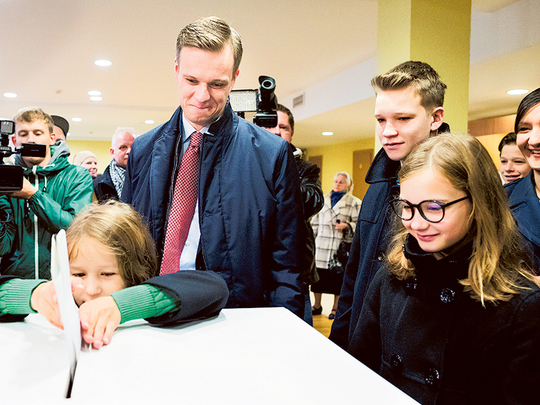
Vilnius: Lithuanians fed up with economic inequality voted for change in round one of a general election, with Monday’s results showing the opposition set to oust the governing leftists in an October 23 run-off.
The national elections commission said near full results showed the centrist Lithuanian Peasants and Green Union party (LPGU) winning 21.62 per cent of the vote, putting them neck-and-neck with the Homeland Union conservatives who took 21.61 per cent.
Leftists finished third with just 14.44 per cent, in a huge blow for Prime Minister Algirdas Butkevicius’s Social Democrats.
“It’s obvious that people voted for change,” President Dalia Grybauskaite said in a statement.
“Citizens clearly said what they think about current government.”
Ramunas Vilpisauskas, director of the Institute of International Relations and Political Science in Vilnius, told AFP the result was clearly “a protest vote against the governing leftist coalition”.
He said a new labour law which makes it easier to hire and fire employees, as well as allegations of political corruption had alienated voters already angered by low wages and mass emigration to western Europe.
Three other parties are expected to enter parliament, signalling complicated coalition talks.
Vilnius University analyst Mazvydas Jastramskis had on Sunday told AFP he expected such talks to get under way between the two rounds, but there was not likely to be a final deal until after the final vote.
Analysts have tipped the farmer-backed LPGU — currently outside parliament and led by popular former national police chief Saulius Skvernelis — as potential kingmaker in coalition talks.
“I think we will be able to talk with both of them,” Skvernelis told reporters upon seeing the results, referring to both the conservatives and the social democrats.
“This is only half a step into parliamentary elections.”
Widely tipped as the next prime minister, Homeland Union leader Gabrielius Landsbergis said the result was a major blow for the ruling elite.
“Lithuanians want change. This is a severe loss for the ruling parties,” said the 34-year-old, who is keen to forge a coalition with the LPGU.
“The core of the coalition can be either LPGU with Social Democrats, or LPGU with conservatives and liberals,” analyst Jastramskis said.
“Today, I would bet on the latter.”
Wage growth and job creation have been key rallying cries for candidates in this country of 2.9 million people, which has been plagued by an exodus of workers seeking higher wages.
Since Lithuania joined the European Union in 2004, an estimated 370,000 people have left — nearly half of whom went to Britain, where concern over immigration from eastern Europe was seen as a key factor in the shock vote to leave the bloc.
In his campaign, the prime minister had promised further hikes in the minimum wage and public sector salaries.
But Homeland Union’s Landsbergis had presented himself as the face of change, vowing to fight emigration and poverty by creating jobs, reforming education, boosting exports and foreign investment.
Lithuania’s economy took a nosedive during the 2008-9 global financial crisis but staged a remarkable recovery, and is slated to grow by 2.5 per cent this year.
Even so, the average wage of just over 600 euros ($670, Dh2,459) per month after tax is one of the lowest in the EU, and inequality and poverty remains comparatively high.
Public sector employee Dale Adasiune said she voted for “new faces” from the LPGU.
“I returned from Spain four years ago and I don’t want to leave again. I found a job [and also got] engaged in volunteer work, but if nothing changes, I’ll leave again,” she told AFP.
Skvernelis, 46, who as police chief won plaudits for fighting corruption in the force, has become a hot political commodity since moving into politics two years ago.
A day before the vote, Russia jangled nerves in this Baltic Eurozone state with its latest deployment of nuclear-capable Iskander missiles in its Kaliningrad exclave, which borders Lithuania and Poland.
But the reassurance provided by Nato’s beefed up presence meant that voters feel more worried about their wallets than about security.
Sunday’s first round vote was to elect 70 members of Lithuania’s 141-seat parliament, who are chosen by proportional representation from party lists.
The remaining 71 will chosen in single-member constituency races in two weeks’ time.
A total of 2.5 million people were eligible to vote, with officials putting turnout at 50 per cent.












